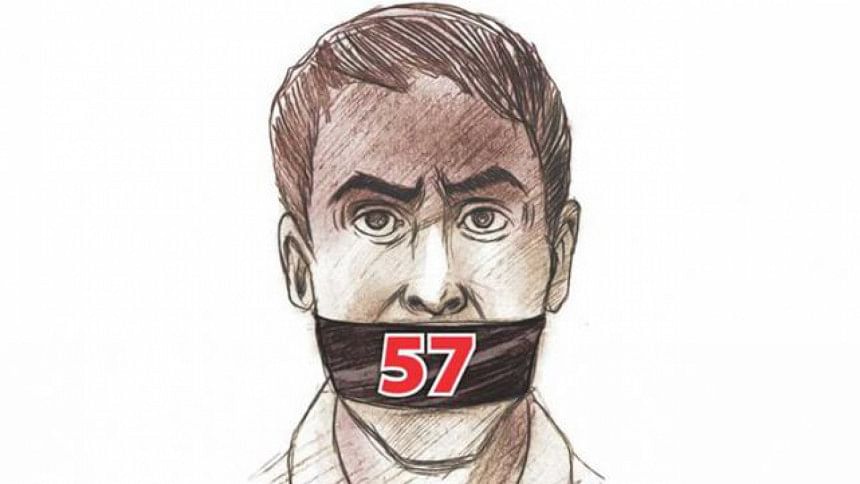Digital security bill placed in JS amid concern

The much-debated Digital Security Bill-2018 was placed in parliament last night.
Telecom and ICT Minister Mustafa Jabbar placed the proposed law before the House, which was sent to the parliamentary standing committee on the ministry concerned for scrutinising it. The committee had also been asked to submit a report to parliament within four weeks.
“One of the main objectives of the proposed law is to ensure the country's security from digital crimes and ensure security of people's lives and assets,” the minister said while placing the bill.
Different quarters, including Shampadak Parishad, an organisation of editors of the country's national dailies, Newspapers Owners' Association of Bangladesh, senior journalists, rights activists and ambassadors of different countries in Dhaka expressed deep concern over the proposed law, specially over the inclusion of the controversial section 57 of the ICT Act and some strict provisions in the Digital Security Bill.
They also demanded that the Digital Security Bill be finalised following discussions among all stakeholders, saying that the law should not be enacted hastily.
The government on several occasions said section 57 of the ICT Act would be removed that deals with defamation, hurting religious sentiments, causing deterioration of law and order and instigating against any person or organisation through publishing or transmitting any material in websites or in electronic form. It stipulates maximum 14 years in prison for the offences.
The Digital Security Bill-2018 splits these offences into four separate sections (21, 25, 28 and 29) with punishment ranging from three to 10 years' jail term.
Amid growing concern, several ministers had assured the journalist community not to worry about the Digital Security Bill, saying that all stakeholders would be consulted before getting it passed.
The cabinet on January 29 approved the draft Act.
Journalists and rights defenders fear the freedom of the press and expression was put to the sword due to the proposed law. They also observed that there would be every chance of the proposed law being misused against people's right to express themselves.
WHAT THE DRAFT LAW SAYS
Section 21 of the proposed law says anyone spreading negative propaganda against the Liberation War or the Father of the Nation, using digital devices or instigates to do so, will risk being sentenced up to 14 years in jail or a fine of up to Tk 1 crore or both.
He or she will face up to life sentence or Tk 3 crore in fine or both for committing the offence for the second time, it said.
Section 25 says a person may face up to three years in jail or Tk 3 lakh in fine or both if he or she is found to have deliberately published or broadcast in a website or electronic form -- something which is attacking or intimidating or which can make someone dishonest or disgruntled; knowingly publish or broadcast false and distorted (full or partial) information to annoy or humiliate someone; knowingly publish or broadcast false and distorted (full or partial) information to tarnish the image of the state or to spread rumour.
A person will face up to five years in jail or Tk 10 lakh or both for committing the offence for the second time, it said.
Section 28 says a person may face up to seven years in jail or Tk 10 lakh in fine or both if he or she is found to have deliberately published or broadcast something in the website or in electronic form or get it done to hurt one's religious sentiment and values.
A person will face up to 10 years in jail or Tk 20 lakh or both for committing the offence for the second time, it said.
Section 29 says a person may face maximum three years in jail or Tk 5 lakh in fine or both if he or she commits offence stipulated in section 499 of the Penal Code through website or in electronic form.
He or she will face up to five years in jail or Tk 10 lakh in fine or both for committing the offence for the second time, it said.
Section 31 says a person may face up to seven years in jail or Tk 5 lakh in fine or both if he or she is found to have deliberately published or broadcast something in the website or in electronic form which can spread hatred and create enmity among different groups and communities and can cause deterioration of law and order.
Punishment will be up to 10 years in jail or Tk 10 lakh in fine or both for committing the offence for the second time, it said.
According to section 32 of the proposed law, a person may face up to 14 years in jail or Tk 25 lakh in fine or both on charges of computer spying or digital spying if he or she illegally enters the offices of government, semi-government, autonomous or statutory bodies and collect or preserve or send any top secret or secret documents through a computer, digital device, computer network, digital network or any electronic form and help others to do that.
He or she will face imprisonment of up to a life sentence or Tk 1 crore in fine or both for committing the crimes for the second time.
A person may face up to 14 years in jail or Tk 1 crore or both for hacking, section 34 of the bill says.
SOME OTHER PROVISIONS
According to the proposed law, the government will form a Digital Security Agency to ensure national digital security and combating cyber crimes. A director general will lead the body.
To discuss the overall digital security of the country and to take “nationally important decision” over the issue, there will be a National Digital Security Council headed by the prime minister, the draft law reads.
The government, through a gazette notification, will declare some specific computer systems, networks and information infrastructures, as “Essential Information Infrastructures” to serve the purpose of the proposed act.
NO NEED FOR ARREST WARRANT
As per section 43 of the draft law, a police official can search or arrest anyone without any warrant issued by a court.
If a police officer believes that an offence under the proposed law has been committed in a certain place or is being committed, or there is a possibility of crimes, or there is a possibility of destroying evidence, he or she can search the place or any person present there.

 For all latest news, follow The Daily Star's Google News channel.
For all latest news, follow The Daily Star's Google News channel. 








Comments